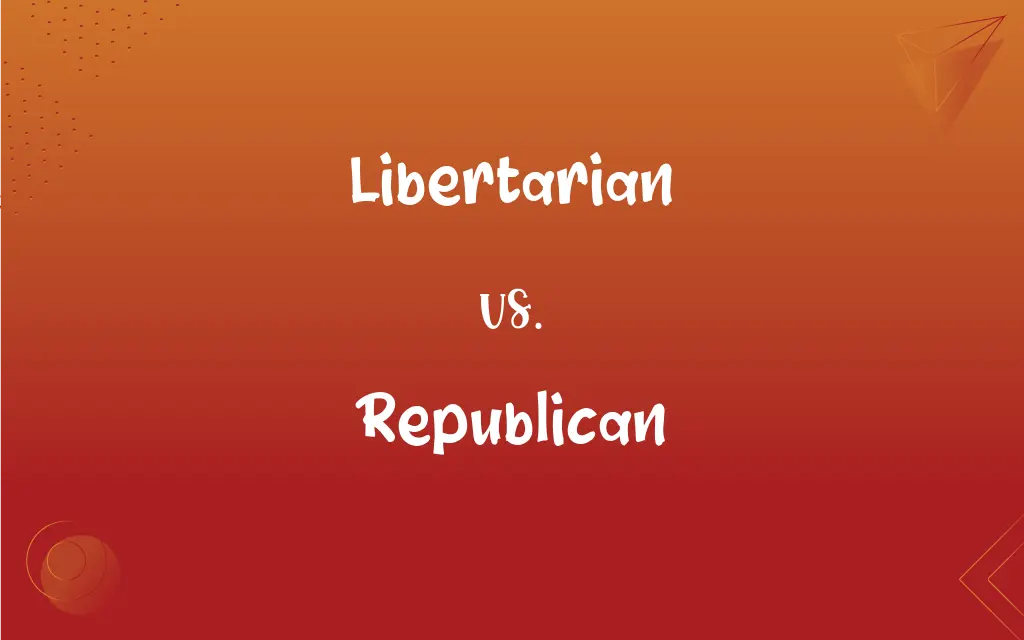Libertarian vs. Republican: What's the Difference?
Edited by Aimie Carlson || By Janet White || Published on December 8, 2023
Libertarians emphasize maximum individual freedom and minimal government intervention, while Republicans traditionally support conservative values and smaller government primarily in economic matters.

Key Differences
Libertarians advocate for minimal government involvement in both personal and economic affairs. Republicans, while also favoring smaller government, generally support more government involvement in certain areas, especially in national security and moral issues.
Libertarians champion free-market capitalism with little to no government interference. Republicans support free-market principles too, but they are more open to certain types of market regulations and interventions.
Libertarians typically support individual choice on social issues, advocating for rights like same-sex marriage and drug legalization. Republicans tend to hold more traditional views on these issues, often opposing liberal policies on moral grounds.
Libertarians generally favor non-interventionism, advocating for limited American involvement in foreign conflicts. Republicans often support a more assertive foreign policy, emphasizing national defense and global leadership.
Both libertarians and Republicans advocate for lower taxes, but libertarians are more inclined towards drastically reducing government spending across all sectors, unlike Republicans who may support spending in areas like defense and law enforcement.
ADVERTISEMENT
Comparison Chart
Government Involvement
Minimal in both personal and economic areas
Smaller in economy, varied in personal matters
Economic Policies
Free market with little/no government intervention
Free market with some regulation and intervention
Social Issues
Support for individual choice and rights
More traditional, often opposing liberal policies
Foreign Policy
Non-interventionism and limited involvement
Assertive, emphasizing national defense
Taxation and Spending
Advocates for drastically lower taxes and spending
Lower taxes, variable spending based on sectors
ADVERTISEMENT
Libertarian and Republican Definitions
Libertarian
Supports individual choice in personal matters, such as marriage and drug use.
As a libertarian, she supported the legalization of same-sex marriage.
Republican
A member or supporter of the Republican Party, often holding conservative views.
The Republican senator voted for tax cuts and increased defense spending.
Libertarian
An advocate for maximum individual freedom and minimal government.
The libertarian argued for reducing government regulations on businesses.
Republican
Favors free-market capitalism with some regulatory measures.
The Republican businessman supported deregulation with minimal necessary oversight.
Libertarian
Believes in substantially reduced government spending and taxation.
He, as a libertarian, advocated for slashing taxes and government spending.
Republican
Often holds traditional views on social issues.
The Republican candidate campaigned against legalizing recreational drugs.
Libertarian
Favors a free-market economy with little governmental oversight.
The libertarian's economic policy centered around deregulation and free trade.
Republican
Generally supports smaller government in economic affairs but may endorse stronger national security measures.
As a Republican, she advocated for less regulation but strong border security.
Libertarian
Often promotes non-interventionist foreign policies.
The libertarian politician opposed foreign military interventions.
Republican
May support government spending in areas like defense and law enforcement.
The Republican mayor increased funding for police and public safety.
Libertarian
One who advocates maximizing individual rights and minimizing the role of the state.
Republican
Of, relating to, or characteristic of a republic.
Libertarian
One who believes in free will.
Republican
Favoring a republic as the best form of government.
Libertarian
One who advocates liberty, either generally or in relation to a specific issue.
Libertarian
A believer in right-libertarianism, a political doctrine that emphasizes individual liberty and a lack of governmental regulation, intervention, and oversight both in matters of the economy (‘free market’) and in personal behavior where no one’s rights are being violated or threatened.
Libertarian
A left-libertarian, an antiauthoritarian believer in both individual freedom and social justice (social equality and mutual aid).
Libertarian
(philosophy) A believer in the freedom of thinking beings to choose their own destiny, i.e. a believer in free will as opposed to those who believe the future is predetermined.
Libertarian
Having the beliefs of libertarians; having a relative tendency towards liberty.
He has libertarian views.
A libertarian capitalist.
Libertarian
(dated) Relating to liberty, or to the doctrine of free will, as opposed to the doctrine of necessity.
Libertarian
Pertaining to liberty, or to the doctrine of free will, as opposed to the doctrine of necessity.
Libertarian
One who holds to the doctrine of free will.
Libertarian
Someone who believes the doctrine of free will
FAQs
What are key principles of libertarianism?
Key principles include individual liberty, free-market capitalism, non-interventionism, and limited government.
How do libertarians differ from conservatives?
Libertarians and conservatives both advocate for economic freedom, but libertarians typically support greater personal freedoms.
What is libertarianism?
Libertarianism is a political philosophy that advocates for minimal government intervention in personal and economic affairs.
Are libertarians pro-gun rights?
Most libertarians support the right to bear arms based on individual liberty principles.
What is the Republican Party?
The Republican Party, also known as the GOP (Grand Old Party), is one of the two major political parties in the United States.
How do Republicans generally view taxation?
Republicans typically advocate for lower taxes and less government spending.
What's the Republican stance on healthcare?
Republicans often favor market-based healthcare solutions and oppose government-run healthcare.
What's a libertarian stance on economic policy?
Libertarians support free-market policies, minimal regulation, and low taxation.
What are core Republican values?
Core values include limited government, free-market capitalism, strong national defense, and conservative social policies.
What's the libertarian view on foreign policy?
Libertarians advocate for non-interventionism, opposing unnecessary military involvement abroad.
What's the Republican stance on education?
Republicans often support school choice, including charter schools and voucher programs.
How do libertarians view government?
Libertarians see government as necessary for protecting rights but advocate for its minimal involvement in daily life.
How do Republicans approach environmental policies?
Republicans tend to prioritize economic growth and are often skeptical of regulations aimed at environmental protection.
How do libertarians view drugs and personal choice?
Libertarians often support decriminalizing or legalizing drugs, citing personal freedom and choice.
Do Republicans support gun rights?
The Republican Party generally supports the Second Amendment and gun ownership rights.
What are Republican views on immigration?
Republicans often emphasize border security and legal immigration, with varying stances on pathways to citizenship.
Do libertarians support social welfare programs?
Generally, libertarians oppose large social welfare programs, preferring private charity and market solutions.
Is libertarianism left or right?
Libertarianism is generally considered right on economic issues (supporting free markets) and left on social issues (supporting personal freedoms).
Are Republicans typically conservative or progressive?
Republicans are generally conservative, especially on social issues.
Do Republicans and libertarians align on issues?
They align on some economic issues like lower taxes and free-market principles but often differ on social issues and the role of government.
About Author
Written by
Janet WhiteJanet White has been an esteemed writer and blogger for Difference Wiki. Holding a Master's degree in Science and Medical Journalism from the prestigious Boston University, she has consistently demonstrated her expertise and passion for her field. When she's not immersed in her work, Janet relishes her time exercising, delving into a good book, and cherishing moments with friends and family.
Edited by
Aimie CarlsonAimie Carlson, holding a master's degree in English literature, is a fervent English language enthusiast. She lends her writing talents to Difference Wiki, a prominent website that specializes in comparisons, offering readers insightful analyses that both captivate and inform.







































































